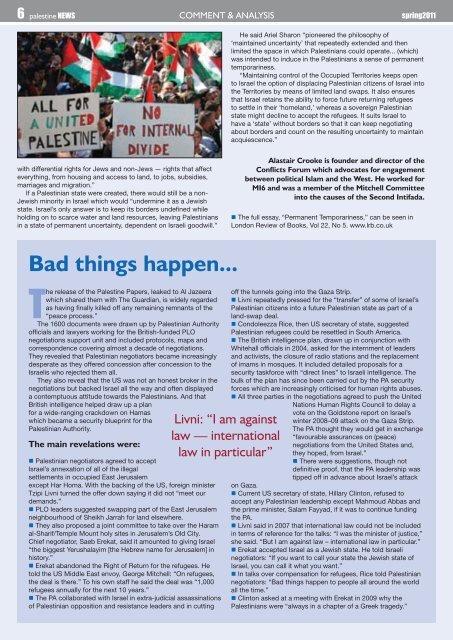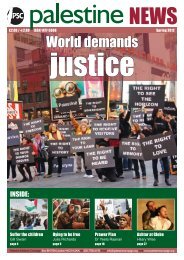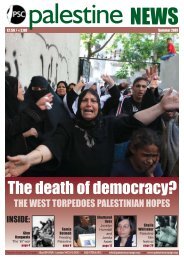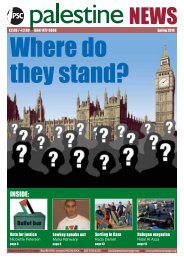InsIDe: - Palestine Solidarity Campaign
InsIDe: - Palestine Solidarity Campaign
InsIDe: - Palestine Solidarity Campaign
Create successful ePaper yourself
Turn your PDF publications into a flip-book with our unique Google optimized e-Paper software.
6 palestine news comment & analysisspring2011He said Ariel Sharon “pioneered the philosophy of‘maintained uncertainty’ that repeatedly extended and thenlimited the space in which Palestinians could operate... (which)was intended to induce in the Palestinians a sense of permanenttemporariness.“Maintaining control of the Occupied Territories keeps opento Israel the option of displacing Palestinian citizens of Israel intothe Territories by means of limited land swaps. It also ensuresthat Israel retains the ability to force future returning refugeesto settle in their ‘homeland,’ whereas a sovereign Palestinianstate might decline to accept the refugees. It suits Israel tohave a ‘state’ without borders so that it can keep negotiatingabout borders and count on the resulting uncertainty to maintainacquiescence.”with differential rights for Jews and non-Jews — rights that affecteverything, from housing and access to land, to jobs, subsidies,marriages and migration.”If a Palestinian state were created, there would still be a non-Jewish minority in Israel which would “undermine it as a Jewishstate. Israel’s only answer is to keep its borders undefined whileholding on to scarce water and land resources, leaving Palestiniansin a state of permanent uncertainty, dependent on Israeli goodwill.”Alastair Crooke is founder and director of theConflicts Forum which advocates for engagementbetween political Islam and the West. He worked forMI6 and was a member of the Mitchell Committeeinto the causes of the Second Intifada.• The full essay, “Permanent Temporariness,” can be seen inLondon Review of Books, Vol 22, No 5. www.lrb.co.ukBad things happen...The release of the <strong>Palestine</strong> Papers, leaked to Al Jazeerawhich shared them with The Guardian, is widely regardedas having finally killed off any remaining remnants of the“peace process.”The 1600 documents were drawn up by Palestinian Authorityofficials and lawyers working for the British-funded PLOnegotiations support unit and included protocols, maps andcorrespondence covering almost a decade of negotiations.They revealed that Palestinian negotiators became increasinglydesperate as they offered concession after concession to theIsraelis who rejected them all.They also reveal that the US was not an honest broker in thenegotiations but backed Israel all the way and often displayeda contemptuous attitude towards the Palestinians. And thatBritish intelligence helped draw up a planfor a wide-ranging crackdown on Hamaswhich became a security blueprint for thePalestinian Authority.The main revelations were:• Palestinian negotiators agreed to acceptIsrael’s annexation of all of the illegalsettlements in occupied East Jerusalemexcept Har Homa. With the backing of the US, foreign ministerTzipi Livni turned the offer down saying it did not “meet ourdemands.”• PLO leaders suggested swapping part of the East Jerusalemneighbourhood of Sheikh Jarrah for land elsewhere.• They also proposed a joint committee to take over the Haramal-Sharif/Temple Mount holy sites in Jerusalem’s Old City.Chief negotiator, Saeb Erekat, said it amounted to giving Israel“the biggest Yerushalayim [the Hebrew name for Jerusalem] inhistory.”• Erekat abandoned the Right of Return for the refugees. Hetold the US Middle East envoy, George Mitchell: “On refugees,the deal is there.” To his own staff he said the deal was “1,000refugees annually for the next 10 years.”• The PA collaborated with Israel in extra-judicial assassinationsof Palestinian opposition and resistance leaders and in cuttingLivni: “I am againstlaw — internationallaw in particular”off the tunnels going into the Gaza Strip.• Livni repeatedly pressed for the “transfer” of some of Israel’sPalestinian citizens into a future Palestinian state as part of aland-swap deal.• Condoleezza Rice, then US secretary of state, suggestedPalestinian refugees could be resettled in South America.• The British intelligence plan, drawn up in conjunction withWhitehall officials in 2004, asked for the internment of leadersand activists, the closure of radio stations and the replacementof imams in mosques. It included detailed proposals for asecurity taskforce with “direct lines” to Israeli intelligence. Thebulk of the plan has since been carried out by the PA securityforces which are increasingly criticised for human rights abuses.• All three parties in the negotiations agreed to push the UnitedNations Human Rights Council to delay avote on the Goldstone report on Israel’swinter 2008–09 attack on the Gaza Strip.The PA thought they would get in exchange“favourable assurances on (peace)negotiations from the United States and,they hoped, from Israel.”• There were suggestions, though notdefinitive proof, that the PA leadership wastipped off in advance about Israel’s attackon Gaza.• Current US secretary of state, Hillary Clinton, refused toaccept any Palestinian leadership except Mahmoud Abbas andthe prime minister, Salam Fayyad, if it was to continue fundingthe PA.• Livni said in 2007 that international law could not be includedin terms of reference for the talks: “I was the minister of justice,”she said. “But I am against law – international law in particular.”• Erekat accepted Israel as a Jewish state. He told Israelinegotiators: “If you want to call your state the Jewish state ofIsrael, you can call it what you want.”• In talks over compensation for refugees, Rice told Palestiniannegotiators: “Bad things happen to people all around the worldall the time.”• Clinton asked at a meeting with Erekat in 2009 why thePalestinians were “always in a chapter of a Greek tragedy.”







